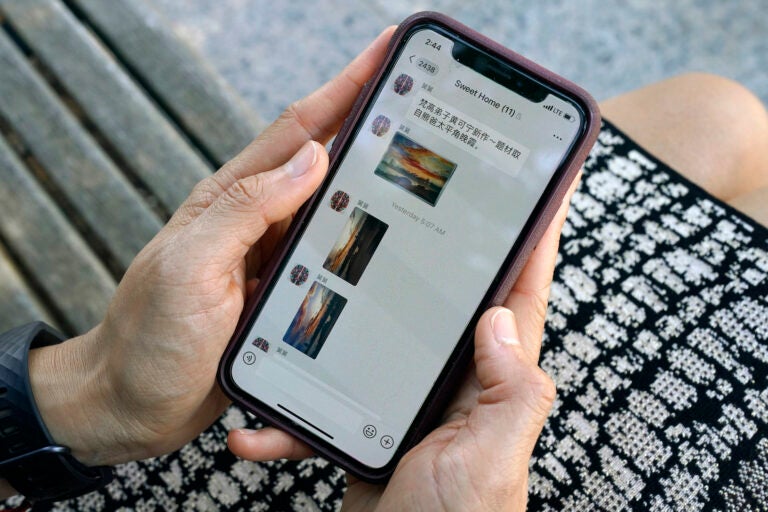How the ban on WeChat would silence interaction by Philly region’s Chinese community
The U.S. government’s prohibition would affect communications with relatives in China, with neighbors here, and with obtaining services, some say.

Sha Zhu, of Washington, shows the app WeChat on her phone, which she uses to keep in touch with family and friends in the U.S. and China, Tuesday Aug. 18, 2020, in Washington. (AP Photo/Jacquelyn Martin)
Updated: 10:55 a.m. Sunday
___
A federal judge in California has blocked the Trump administration from imposing a ban on WeChat. The Chinese-owned messaging and social media app, which also allows users to make payments, was going to be limited starting Sunday. The Trump administration imposed the ban Friday, citing national security concerns.
In the ruling, the court said that a WeChat ban “eliminates all meaningful access to communication in the plaintiffs’ community,” and that an injunction would be in public interest.
Chinatown resident Anna Perng was worried when it looked like WeChat was going to be blocked in the U.S.
For the past five years, she’s been running a support group for immigrants with disabilities that relies heavily on WeChat. The Chinese-owned messaging and social media app, which also allows users to make payments, will be limited by a ban imposed Friday by the Trump administration, citing national security concerns.
“It’s going to be tremendous,” Perng said, describing the impact of the WeChat ban in the Philadelphia region.
WeChat, which has millions of users in the United States, is heavily used by the local Chinese American community to stay in touch with one another, get reliable information and conduct business.
Perng’s support group benefits from WeChat because users can join a discussion without having to provide personal information, as one would follow a hashtag. She said doctors were struggling to give support to Chinese immigrants diagnosed with disabilities because of the language barrier, and because many were hesitant to provide their information due to their legal status.
WeChat solved that problem.
“We would just give out our WeChat contact information, and if a doctor diagnosed someone, they would mention: ‘Hey, do you want to get connected with this support group?’ So now, I think we have to figure out what is an easier way to get that person’s contact information to be able to communicate with them,” Perng said.
Perng, who is also a community activist, said the app has become a vital source of information for the community and a place where government and community organizations can engage with residents.
Neighborhood WeChat groups have thousands of users, she said, and the app has been crucial for providing reliable information about the 2020 census and the COVID-19 pandemic. Philly’s local Chinese newspaper, Metro Chinese Weekly, has been using WeChat to increase its audience through its PhillyGuide, which has over 30,000 followers. Last year, Philadelphia became one of the first — if not the first — tourist destinations with a verified WeChat account in the country.
The app is also a place where immigrants can support one another, share information and understand how to navigate the system.
“So if you’ve just recently arrived in the country, you don’t know anyone, thanks to WeChat you can actually connect with all those sort of Mandarin-speaking neighbors by joining a WeChat group that has your zip code,” Perng said.
Sharon Xiaoyun Hou, director of custom programs at the University of Pennsylvania’s Wharton School, said if the ban on what she called an all-in-one app had taken effect, it would have been a big inconvenience. She compared it to how a ban on Facebook and Google would feel for Americans.
Most of the business relations she conducts with Chinese clients happen via WeChat. And she uses it daily to communicate with friends and family in China. She said the youngest of her three children, all born in the U.S., talks with his grandparents in Shanghai every day.
“The possibility of not having the option of just picking up and dial them through WeChat… we have been trying to figure out what are the equally convenient ways to do similar things, and it just turns out not to be so easy,” she said.
Hou said there are not many alternatives to WeChat. Facebook is blocked in China, and some other apps are restricted. She said she will try Telegram and WhatsApp, but she’s worried that her parents, who are in their 70s, are going to have difficulties downloading other apps, especially if they’re not in Mandarin.
“I’m trying to tell myself and tell the family that, you know, if there is love, if there’s will, there’s way — we will figure out how to connect. But if WeChat is not here, then you have to jump through these hoops to find, hopefully, something that’s comparable.”
Hou also feels disappointed. One of the things she’s always been very proud of, in the 22 years she’s been in America, is freedom of speech. This policy feels unjustifiable, she said.
“We never saw such censorship in a certain media before. And the fact that one media is targeted — because it is a Chinese app, because it’s so successful — it feels more like a retaliation than a security concern,” she said.
Jing Peng, program manager at the Wharton School, said she’s been using WeChat daily for years, to connect with friends and family in China, with her neighbors and community in Philly, and as her main business communication tool with clients.
Losing it would mean losing a big part of her community, she said, but also part of her identity. It’s like cutting off people’s Facebook, Twitter, Instagram and WhatsApp, all at once.
“It’s like cutting an arm off you,” she said. “People live in WeChat, basically. The first thing they do, when they open their eyes, is check their messages from WeChat, what happened overnight? And that’s the last thing before people go to bed.”
Peng said the only way she can explain the ban to herself is as a political strategy.
“I think Trump is trying to win the election and he’s using China as one of the cards that he keeps up playing again and again,” she said.
Chinatown activist Perng agreed, saying Trump’s policy feels like another attack on Chinese Americans, right after blaming China for the coronavirus pandemic.
“There’s a long history in the United States of sort of scapegoating Asian Americans, Chinese Americans … associating us with stereotypes about being dirty, being diseased and carriers of disease, but also sort of being, like, disloyal or somehow spies for China,” she said.
“So when all of that comes together and we’re taking away a vital source of communication, of emotional support for a lot of immigrants, it does feel very personal.”

Get daily updates from WHYY News!
WHYY is your source for fact-based, in-depth journalism and information. As a nonprofit organization, we rely on financial support from readers like you. Please give today.






